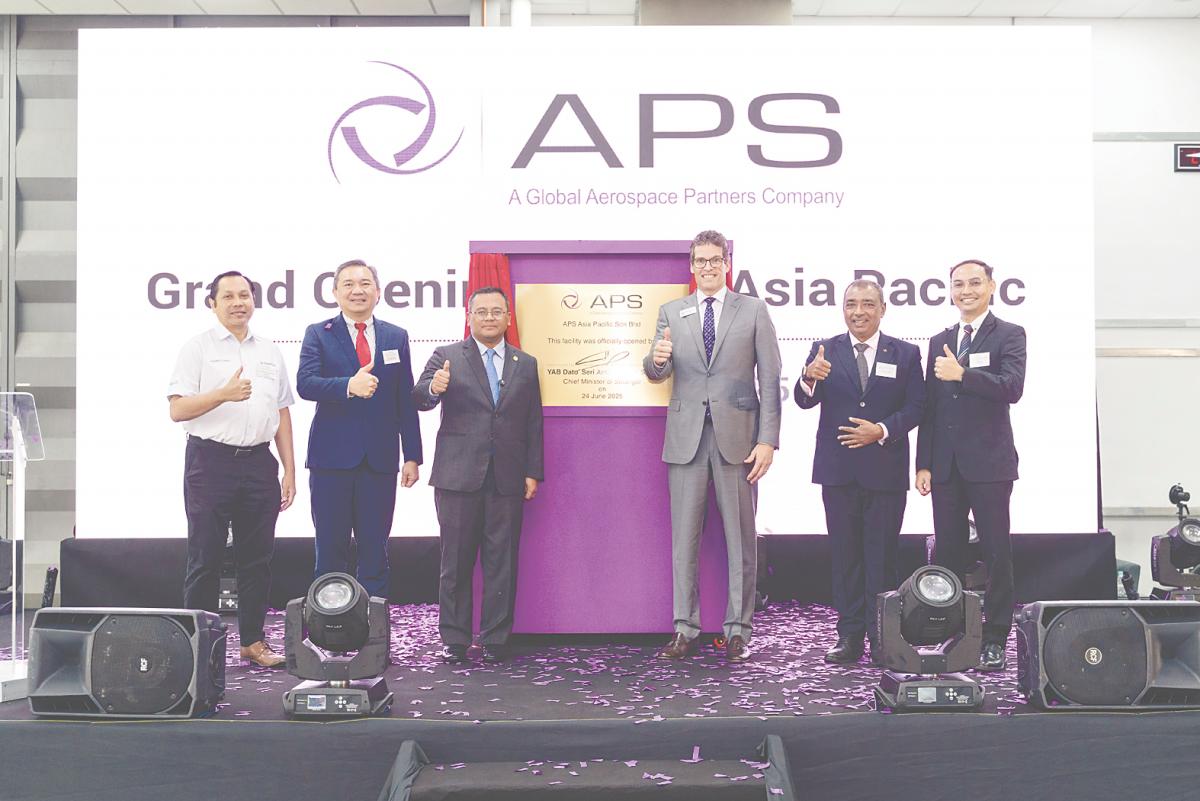PETALING JAYA: Aircraft Propeller Service (APS), a global leader in aircraft propeller maintenance, repair and overhaul (MRO), today opened its state-of-the-art MRO facility in Malaysia to serve the country and Asia-Pacific region.
The world-class MRO centre reinforces APS’ long-term commitment to the Asia-Pacific region, the world’s largest market for turboprop aircraft.
The facility in Selangor is APS’s first in Asia and adds to its existing global footprint in the United States and Brazil. APS is the only MRO company in Asia and the Americas licensed to perform original equipment manufacturer-proprietary 568F propeller repairs under an agreement with Collins Aerospace, the propeller manufacturer.
The US Federal Aviation Authority and the Civil Aviation Authority of Malaysia have both certified the new facility
with EASA and other country approvals to follow soon.
Selangor Menteri Besar Datuk Seri Amirudin Shari opened the new MRO facility along with APS CEO Daniel Colbert and APS Asia Pacific managing director Fergus Lopez.
“I am delighted that APS has chosen Selangor to be its home in Asia Pacific. This will be music to the ears of companies in the industry of airlines and airports in the region, especially the likes of ATR, Airbus and Embraer operating short-haul routes. APS’s decision to set up shop in Selangor has taken the state’s goal of being the gateway to Asean to a whole new level, representing their belief that Selangor has the economic landscape and dynamic talent to take up these jobs, and I’m confident that young Selangorians will stand to benefit through the many job opportunities this MRO facility will offer,” said Amiruddin.
The 30,096-square-foot facility includes a temperature- and humidity-controlled factory floor and a three-storey administrative office. It will provide full in-house MRO capabilities for ATR 42/72 and Airbus C295 propellers, with plans to introduce further MRO capabilities over time.
Colbert noted: “This MRO centre represents more than a geographic expansion. It is a strategic investment in workforce development and technical excellence, and a commitment to be close to our customers. By combining our proprietary expertise with Malaysia’s skilled talent pool, we are building a center of excellence in Asia Pacific for propeller MRO to support operators in this part of the world.”
Twenty of APS Malaysia’s 30 employees have already completed APS’s rigorous training in the US and Brazil, gaining certifications in complex inspections and original equipment manufacturer-authorised repair techniques. In addition, each of these trainees has completed 31 mandatory technical courses to ensure compliance with global performance standards.
Lopez said: “Our Asia-Pacific operation meets the same world-class standards as our facilities in Brazil and the US. This achievement reflects the dedication of our Malaysian team, who have gone through very comprehensive technical training.”
Meanwhile, Malaysian Investment Development Authority (Mida) CEO Datuk Sikh Shamsul Ibrahim Sikh Abdul Majid remarked, “APS’s decision to establish its first MRO facility in Asia-right here in Malaysia underscores our nation’s growing role in the global aerospace ecosystem. This strategic investment aligns perfectly with our New Industrial Master Plan 2030 and marks another step forward in Malaysia’s transformation into a high-tech, innovation-driven economy.
“Beyond strengthening our domestic supply chain and enhancing industry resilience, APS’s commitment to knowledge transfer and talent development will equip Malaysians with specialised, future ready skills. This is exactly the kind of high-value, tech-driven investment that Mida champions – one that uplifts our local capabilities and reinforces Malaysia’s standing as a leading aerospace hub.”
Asia-Pacific accounts for 37% of the global ATR fleet and is projected to require nearly 1,000 additional 50-70 seat commercial turboprop aircraft over the next two decades. By establishing this facility in Malaysia, APS is strategically positioned to support this growth while reducing turnaround times and improving service efficiency for regional customers.









